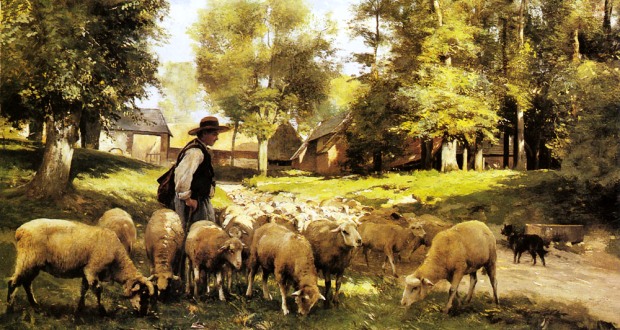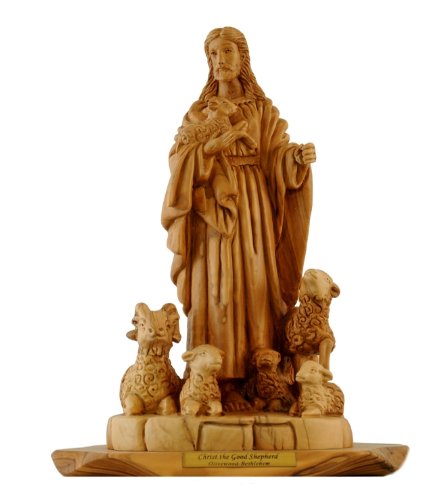Good Shepherd – I give them eternal life

Good Shepherd – “I know my sheep; they listen for my voice”
The Gospel Reading this Sunday is one of the shortest of the year, but the concept that it seeks to illustrate is very full of meaning.
The Chapter of St. John’s Gospel from which this passage is taken is called the Gospel of the Good Shepherd. On one hand it tells us the reaction of the sheep to the Good Shepherd, and in telling us that, it also gives us an insight into the qualities of the Good Shepherd, and into the qualities that all those who have been given authority over others- parents, teachers, national and community leaders or spiritual guides, parish leaders. As we meditate on these passages, we therefore think with gratitude of good shepherds we have known. Our meditation will also tell us what type of leaders we are, and should help us as we exercise authority.
In order to understand well the passage given to us for our meditation we must look at the chapter which goes before this one; Chapter nine of the Gospel of John in which we have the dialogue between the Jewish leaders, i.e. the Scribes and the Pharisees and the man born blind who has been healed by Jesus. In this passage the scribes and Pharisees are portrayed as leaders who put themselves above the people and very condemnatory; “You were born in sin!” they answered. “Are you trying to teach us?” And they threw him out of the synagogue”. They are portrayed as leaders of whom the people are afraid; “They said this because they were afraid of the Jewish leaders, who had announced that anyone saying Jesus was the Messiah would be expelled from the synagogue. That’s why they said, “He is old enough to speak for himself. Ask him.” They are portrayed as people without compassion; “Some of the Pharisees said, “This man Jesus is not from God, for he is working on the Sabbath.” Others said, “But how could an ordinary sinner do such miraculous signs?” So there was a deep division of opinion among them.”
Chapter 10 of John’s Gospel from which the passage given for our meditation this weekend is taken is known tells us about the type of leadership which is expected of disciples and in the section given to us develops three themes:
-
 in verse 27 the sheep obey not because of any external compulsion, but because they experience that they belong to the shepherd and are known by him; the love of the Shepherd is manifest for all to see. The Shepherd is willing to spend him/herself for the good of the Sheep and the sheep feel totally protected knowing that the Shepherds cares for them. The shepherd therefore is close to his sheep and goes through the process of getting to know them. Because of that love which propels the shepherd to know the sheep, the shepherd is not condemnatory; on the contrary he/she is a person of compassion. Even more noteworthy is the reason for the sheep to know and trust the shepherd; the shepherd does the best that he/she can for the sheep; “I give them eternal life, and they shall never perish.” What a challenge for those who want to be or are our leaders, in the church, in education, in public life, in the sporting arena; to ensure that those whom they lead never perish. When love is manifested by leaders in such concrete care and concern the result is more often than not loyalty.
in verse 27 the sheep obey not because of any external compulsion, but because they experience that they belong to the shepherd and are known by him; the love of the Shepherd is manifest for all to see. The Shepherd is willing to spend him/herself for the good of the Sheep and the sheep feel totally protected knowing that the Shepherds cares for them. The shepherd therefore is close to his sheep and goes through the process of getting to know them. Because of that love which propels the shepherd to know the sheep, the shepherd is not condemnatory; on the contrary he/she is a person of compassion. Even more noteworthy is the reason for the sheep to know and trust the shepherd; the shepherd does the best that he/she can for the sheep; “I give them eternal life, and they shall never perish.” What a challenge for those who want to be or are our leaders, in the church, in education, in public life, in the sporting arena; to ensure that those whom they lead never perish. When love is manifested by leaders in such concrete care and concern the result is more often than not loyalty. -
and so in verse 28 the shepherd is perfectly secure in the loyalty of the sheep. Good shepherds don’t have to wonder, “Am I loved?” or “Are the sheep loyal to me?” they can therefore set about the work of leadership in freedom. Secure in their role, they can be creative, try new things, pose new challenges. The Good shepherd also knows that the sheep love and respect him/her. The response of the sheep to the loyalty of the shepherd is also loyalty and trust.
-
In verses 29 and 30 we see that the security of good shepherds is rooted in their union with God. The good shepherd knows that it is in God that he finds the strength to be loyal and to spend him/herself for the Sheep. The good shepherd knows that he/she is only the filling in for the real Shepherd, God the Father and therefore stays united to the Father.
The Good Shepherd is always a person of prayer and a person who prizes this union with the Father. Again what a challenge to our leaders; to be aware of a higher loyalty, loyalty to a Supreme Being, call him what you may, I call him God the Father, but which manifests itself in the living and promoting of the higher values of love, truthfulness, honesty, trust, compassion, and reconciliation. Too often the characteristics of our leaders are those of the scribes and Pharisees described in Chapter nine of John’s Gospel.
Today the Gospel calls us to thank God for the good Shepherds that we have known, some in church, some in public life but who all exhibited the qualities described for us in the Gospel passage of St. John, known as the Gospel of the good shepherd. We thank God for the famous ones like Ghandi, Mons. Romero, Martin Luther King, Mother Teresa, Archbishop Pantin. They have left us an example of selfless service to those in their charge and very close union with God the Father, the chief Shepherd. But let us also thank God for the other shepherds, perhaps not so famous and perhaps still alive, like parents and God parents and teachers, parish priests who really do the best that they can to help us reach eternal life and not perish. The Gospel also calls us however to look at our own lives and to ask ourselves whether or not we are Good shepherds.
May our union with God the Father through the Eucharist help us to be good shepherds, caring for the sheep, spending ourselves selflessly for them, loving them without seeking recompense and well aware that we only represent the true Shepherd, God the Father.
Prayer
All powerful and ever-loving God, your Son Jesus Christ was the true shepherd, leaving us a model of leadership which truly brings growth to those in our care. May our union with You, God our Father help us to be good shepherds, caring for the sheep, spending ourselves selflessly for them, loving them without seeking recompense and well aware that we only represent YOU, the true Shepherd. We ask this through the intercession of Mary, the divine shepherdess and Jesus your Son. Amen
Gospel John 10 : 27 – 30
Jesus said: “My sheep hear my voice; I know them, and they follow me. I give them eternal life, and they shall never perish. No one can take them out of my hand. My Father, who has given them to me, is greater than all, and no one can take them out of the Father’s hand. The Father and I are one.”





